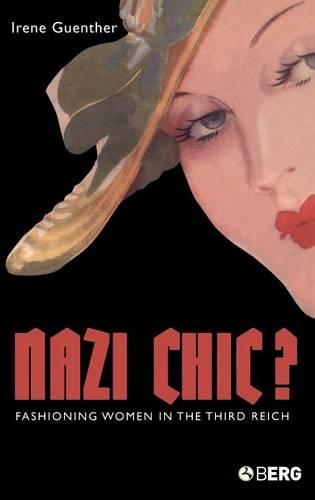
Nazi Chic: Fashioning Women in the Third Reich
(Hardback)
Available Formats
Publishing Details
Nazi Chic: Fashioning Women in the Third Reich
By (Author) Professor Irene Guenther
Bloomsbury Publishing PLC
Berg Publishers
1st September 2010
United Kingdom
Classifications
General
Non Fiction
Cultural studies: dress and society
European history
391.20943
Physical Properties
Hardback
544
Width 156mm, Height 234mm, Spine 21mm
Description
This is the first book in English to deal comprehensively with German fashion from World War I through to the end of the Third Reich. It explores the failed attempt by the Nazi state to construct a female image that would mirror official gender policies, inculcate feelings of national pride, promote a German victory on the fashion runways of Europe and support a Nazi-controlled European fashion industry. Not only was fashion one of the countrys largest industries throughout the interwar period, but German women ranked among the most elegantly dressed in all of Europe. While exploding the cultural stereotype of the German woman as either a Brunhilde in uniform or a chubby farmers wife, the author reveals the often heated debates surrounding the issue of female image and clothing, as well as the ambiguous and contradictory relationship between official Nazi propaganda and the reality of womens daily lives during this crucial period in German history. Because Hitler never took a firm public stance on fashion, an investigation of fashion policy reveals ambivalent posturing, competing factions and conflicting laws in what was clearly not a monolithic National Socialist state. Drawing on previously neglected primary sources, Guenther unearths new material to detailthe inner workings of a government-supported fashion institute and an organization established to help aryanize the German fashion world.How did the few with power maintain style and elegance How did the majority experience the increased standardization of clothing characteristic of the Nazi years How did women deal with the severe clothing restrictions brought about by Nazi policies and the exigencies of war These questions and many others, including the role of anti-Semitism, aryanization and the hypocrisy of Nazi policies, are all thoroughly examined in this pathbreaking book.
Reviews
Winner, Millia Davenport Award 2005, Costume Society of America Winner, Sierra Book Prize 2005, Western Association of Women Historians 'This is a marvellous example of how the seemingly peripheral or mundane can shed light on the contradictions and tensions of the worst kind of totalatarian regime. It's also a susprisingly good read, excised as it is of the usual jargon that sometimes mars academic writing. Well illustrated, too.' BBC History Magazine 'The fascinating-chilling--aspect of ... Irene Guenther's detailed account of the postwar evolution of German women, is just how central a part of Nazi ideology fashion--and everything to do with appearance--became. .' The Times (London) 'Nazi chic' is a remarkable and welcome document, a careful look at familiar terrain from a fresh perspective.' London Review of Books 'Guenther's thoroughly researched study takes the seemingly trivial subject of female fashion during the Third Reich and makes a convincing case for its significance...and makes powerfully apparent how fashion was often of greater concern to ordinary Germans (and to their leaders) that the trajectory of high politics.' The American Historical Review 'A serious and deeply researched study of a subject that is too often dismissed as frivolous and shallow.' David Cesarani, editor of The Final Solution and Genocide and Rescue 'An exhaustively researched, well-written, and highly original book. This study of how the Nazi leaders attempted to shape female appearance is a wonderfully creative work.' Jonathan Petropoulos, Claremont McKenna College, author of 'The Faustian Bargain: The Art World of Nazi Germany' 'Irene Guenther has written a brilliant and chilling analysis of the politics of fashion in the Third Reich. Although fashion is often dismissed as a frivolous topic, Guenther demonstrates that for the Nazis it was an important and deeply contested ideological field, involving antisemitism, cultural nationalism, and gender ideology. Susan Sontag explored the dark glamour of the SS uniform in her famous essay, Fascinating Fascism. Now Guenther investigates how the Nazi dictatorship attempted to police the image of German women.' Valerie Steele, author of 'Paris Fashion' and 'Fifty Years of Fashion: New Look to Now' 'Stylishly written, and without jargon, this is a rare work of cultural history. With its delightful vignettes and intelligent argumentation, it takes one on a delightful tour through the world of Nazi fashion. While one would expect to find only dirndls and sensible shoes, as Nazi fashion sounds like an oxymoron, Guenther uncovers a parallel world of Nazi style full of high heels, makeup, and slick ladies in French-inspired dresses (perhaps especially among the wives and consorts of top Nazi leaders).' Eric A. Johnson, author of Nazi Terror: The Gestapo, Jews, and Ordinary Germans 'Well-written, engrossing and exhaustive... By exploring this previously unstudied realm of a much-studied era, "Nazi Chic" provides an original and absorbing glimpse into the absurdity and exactitude of the National Socialist enterprise." Amanda Fortini, Forward 'Irene Guenther's well-researched, richly detailed and thought-provoking study shows how fashion illuminates crucial issues in the history of the Third Reich. Drawing from an impressive array of archives, fashion magazines and newspapers, as well as interviews and correspondence, Guenther provides a comprehensive social and institutional study of fashion in the Third Reich. Guenther has written a significant book that deserves a wide readership. In addition to confronting some of the most important questions regarding Nazi Germany, it asks for serious thinking about the relationship between consumerism and violence.' Shelley Baranowski, Central European History Journal vol 38.3 '[T]he details [in the book] -- such as the fact the Hermann Goring liked to wear rogue and violet kimono, or that deep into the war, hausfraus out of necessity unraveled burlap sacks and reknitted them into panties -- become mesmerizing.' Nora Sohnen, eastbayexpress.com 'From now on, every historian who is interested in this period has to read this brilliant book.' Francia 34/3 (2007)
Author Bio
Irene Guenther is Professor of History, Houston Community College.
